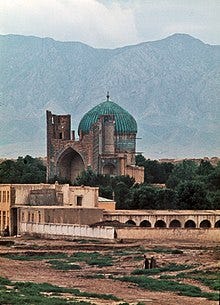(NOTE: I published the first version of this essay in 2021 right after the Taliban took power in Afghanistan. It appears in an anthology published by Journal of the Plague Years. This week the Taliban has cut off Wi-Fi access for many Afghans.)
This week for me and many others who love Afghanistan has been a struggle. It's difficult to express our feelings about the situation in English; it would be much easier in Dari. That language encourages the intimacy of connection and the pain of loss in ways it is awkward to do in English, as wonderful as our language is in other ways.
English is a language of the brain; Dari is a language of the heart.
When you encounter a friend in a village in Afghanistan, you both stop where you were headed to embrace, hold hands and inquire about each other's heart, body, mind, family, and so on. It can be a long list and if you've not met recently, these greetings may take a while.
And when you really stop and think about it, what is it that matters more in life than expressing how we feel about each other?
Money? Fame? Power? Possessions? Accomplishments? Awards?
I don't think so.
In Dari you are able to say "my heart loves your heart" in a way that does not imply romantic love but does capture how much you truly care for each other. It doesn't sound odd at all.
Meanwhile, in America all too often our encounters start with "How are you?" And end with "Fine. You?"
In fact it is so unsatisfying to me that I try, and I know this is weird, to adapt something of Dari rituals when talking with my American friends. Each person is made of specific qualities I value, so despite the limitations of our language, I always try to say what I mean and to mean what I say.
Especially when I say "I love you," that is exactly how I feel.
***
As an aggregator of the news, one of my main goals is to locate what is hopeful about otherwise crushing developments if I can, but in the case of Afghanistan right now this is difficult.
Some news reports suggest that the Taliban have fundamentally changed, but I doubt that. They say they will extend amnesty to government workers, respect the rights of women, and preside over a peaceful transition of power, but those are empty promises until we see proof.
Meanwhile, there is plenty of historical precedent for what usually happens when guerrilla forces assume power, and that record is soaked with the blood of innocents.
Sadly, Afghanistan has been criss-crossed by conquerers throughout its recorded history. Just to mention a few of the empires that resulted: Alexander the Great and his Macedonians, the Greco-Bactrians, Kushans, Indo-Sassanids, Kabul Shahi, Saffarids, Samanids, Ghaznavids, Ghurids, Kartids, Timurids, Hotakis and the Durranis.
In their oral histories, Afghans most often bring up the Mongol invaders, starting with Genghis Khan in 1221. And they talk about him and others as if they are still around the next bend.
For example, just north of the town of Taloqan is a magnificent landmark known as کوه بز سیاه, which translates as Black Goat Mountain.
While riding in the back of a truck from Khanabad packed with people, goats and chickens fifty years ago, I spoke with a man who recounted stories that have been passed from father to son over the past thousand years.
"When they rode in last time, the Mongols cut off the heads of a million people," he said, repeating an account that I had heard many times before.
"And they will be back. Just on the other side of Black Goat Mountain there are hundreds of thousands of Mongols waiting to return."
I guess he was referring to the peaceful Uzbek population of Takhar Province, living in what has long been a poor agricultural area.
A few hundred miles to the west of Takhar, during a visit to Mazar-e-Sharif, I heard similar tales about the Hazara population living in a nearby isolated valley. "They will ride in here soon, so watch out."
Nearby are the ruins of Balkh, a legendary city in the pre-Mongol era, with some of the most ghostly remains I have ever visited. Somewhere in my boxes in storage may still be the shards of pottery I collected at the site, which appeared to be many centuries old.
Balkh is where historians confirm that Mongol hordes did in fact decapitate many residents when they struck, and if the eerie winds whistling through the area are not the voices of those long dead, my imagination must have betrayed me.
Among Afghanistan's intractable problems is the stark reality that it less an actual country than the cobbled together homeland for at least seven major tribal groups. Besides the Uzbeks and the Hazara, there are the Tajiks, Pashtus, Turkomans, Baluchis, and Nuristanis.
Plus four or five smaller groups, most notably the Kochi, who are nomads.
The name of the country means "Land of the Afghans," which is what the largest ethnic group, the Pashtuns, call themselves. That name leaves every other group out, which complicates matters immensely.
My point here is that Afghanistan has plenty of internal problems without outsiders like the British, Russians and Americans getting involved. No foreign occupier ever stays for long anyway, because the local people simply won't tolerate them.
And once the foreigners leave, the Afghans get back to business as usual. What that means is inter-ethnic competition and violence.
So as of August 2021, after decades of operating as a guerrilla army, the Taliban have to figure out how to somehow govern what many believe to be an ungovernable land. Not only are the traditional tribal loyalties an issue, the big cities, especially Kabul, have modernized over the past 20 years and millions of men and women are now educated.
The educated class wants nothing of the ancient ways. They want what all modern people want — a peaceful life, a better life. Will the Taliban throw all of that progress away and chop off the head of the modernizing society they've inherited? Or will they grow into the moment and embrace the future?
The ghosts of Balkh have been waiting a thousand years for the answers to those questions.
***
On Friday afternoon, my despair over Afghanistan was counter-balanced by an outing to a favorite spot with a friend. It was a slightly smokey day in the Bay Area from the distant wildfires but the smoke stayed high while we stayed low.
We stopped at a coffee house for a spell and then she drove us through an ancient tunnel to the edge of the bay where you can smell the salt in the air.
All of this reminded me how important it is to celebrate beauty and hope and the love of friendship even as we mourn the horror and sadness of the world around us.
At the end of the day, as the sun shrank to the west, the smoke stayed high, but down at the surface of the earth the air still smelled sweet.
HEADLINES:
Israeli military begins its ground offensive in Gaza City as thousands of Palestinians flee (AP)
A United Nations Commission of Inquiry concluded that Israel has committed genocide in Gaza and that top Israeli officials including Prime Minister Benjamin Netanyahu had incited these acts. (Reuters)
‘Alarming but not unexpected’: NYT lawsuit just latest example of Trump’s presidential lawfare (Guardian)
The Irony of Using Charlie Kirk’s Murder to Silence Debate (Atlantic)
JD Vance vows retribution on liberal institutions after Charlie Kirk killing (WP)
Tyler Robinson charged with aggravated murder of Charlie Kirk, with prosecutors seeking death penalty (ABC)
Kirkwashing: Right Sanitizing Charlie Kirk’s Legacy; Casting Him as Martyr is Preposterous (Daily Kos)
Republicans keep using one dangerous word in the wake of Charlie Kirk's assassination, crafting a narrative of victimhood aimed at enacting retribution against their political opponents, HuffPost's Paul Blumenthal reports. [HuffPost]
“Im not afraid of you!' - Cory Booker clashes with Kash Patel (BBC)
60 violations in 50 days: Inside ICE’s giant tent facility at Ft. Bliss (WP)
The N.Y.P.D. Is Teaching America How to Track Everyone Every Day Forever (NYT)
The Coming D.C. Crime Boomerang (Atlantic)
Shave or Separate: New Pentagon Policy Limits Medical Waivers to 12 Months (Air & Space Forces Mag)
Europe declares silent war on Russia — 2,000,000 tons of the ‘blue oil’ through a +400 mile pipeline (ECNews)
Earth's ozone layer is healing thanks to international action, UN says (France24)
Climate scientist discusses "chemtrails" conspiracy theories (Axios)
Many sports fans are unhappy with how much it costs to watch their games, an AP-NORC poll finds (AP)
Berkeley nonprofit has saved over 1.5 million acres of island forests and marine ecosystems (Berkeleyside)
Kafka-land at UC Berkeley (Nation)
Publishers Clearing House’s bankruptcy means ‘forever’ winners will no longer get paid (CNN)
‘Selling coffee beans to Starbucks’ — how the AI boom could leave AI’s biggest companies behind (TechCrunch)
Report: You To Be Fired For Reading This Headline About Charlie Kirk (Onion)

